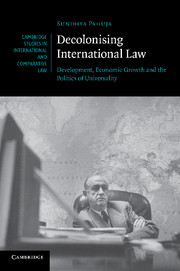Book contents
- Frontmatter
- Contents
- Acknowledgements
- 1 Introduction
- 2 Inaugurating a new rationality
- 3 From decolonisation to developmental nation state
- 4 From permanent sovereignty to investor protection
- 5 Development and the rule of (international) law
- 6 Conclusion
- Appendix One A note on the use of ‘Third World’
- Appendix Two Harry Truman – Inaugural Address
- Bibliography
- Index
- cambridge studies in international and comparative law
6 - Conclusion
Published online by Cambridge University Press: 07 October 2011
- Frontmatter
- Contents
- Acknowledgements
- 1 Introduction
- 2 Inaugurating a new rationality
- 3 From decolonisation to developmental nation state
- 4 From permanent sovereignty to investor protection
- 5 Development and the rule of (international) law
- 6 Conclusion
- Appendix One A note on the use of ‘Third World’
- Appendix Two Harry Truman – Inaugural Address
- Bibliography
- Index
- cambridge studies in international and comparative law
Summary
Exposition
International law in its aspirational dimension bears an enduring relation to an idea of justice. This relation holds out a promise of universality that has inspired many attempts by the Third World to use international law as a site of political struggle. But throughout our exploration here, we have seen that many such attempts have had the unintended consequence of legitimising an expanding domain of international intervention into the Third World.
The expansion has occurred through a certain dynamic inaugurated with the institution of the post-war settlement. The instituted dynamic both reveals and is revealed in the constitution of the space of the international and relations within it. In a sense, the dynamic is something like a ‘rationality of rule’, though it has no originating mind, locale or institution. Instead, it is a diffuse rationality, operative through a constantly reconfigured relation between the constituent parts of the ideological–institutional complex we call ‘international law’. In this book I have concentrated on what I see as a key axis in this dynamic: namely, the relations between the international political and economic institutions and the delineation and movement of issues between them. But its nodes also include security bodies, nation states and non-governmental organisations, as well as the academy and practice in their varying forms.
- Type
- Chapter
- Information
- Decolonising International LawDevelopment, Economic Growth and the Politics of Universality, pp. 254 - 260Publisher: Cambridge University PressPrint publication year: 2011

